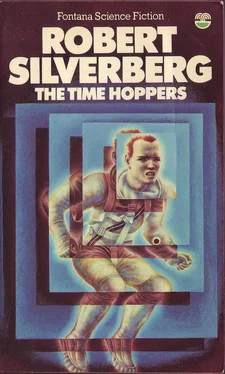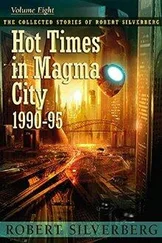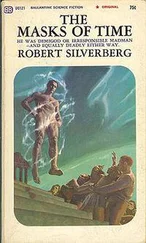Lanoy said, “If you arrest me, I’ll break you, Quellen. I tell you there’s nothing illegal in what I’m doing. Look here—I’m a registered slyster.” Lanoy produced a card, properly stamped.
Quellen was stymied. Lanoy definitely had him off balance. Ordinarily, he was better equipped to deal with criminals, but the events of the last few trying days had weakened his fibres. Quellen chewed his lip, watched the little man closely, and fervently wished that he were back beside his Congo stream throwing rocks at the crocodiles.
“I’m going to put a stop to your time-travel business, anyway,” Quellen finally said.
Lanoy chuckled. “I wouldn’t advise trying it, Quellen.”
“CrimeSec to you.”
“I wouldn’t advise making trouble for me, Quellen,” Lanoy repeated. “If you cut off the flow of the hoppers now, you’ll turn the past topsy-turvy. Those people went back. It’s recorded in history. Some of them married and had children, and the descendants of those children are alive today.”
“I know all that. We’ve discussed the theory in great detail.”
“For all you know, Quellen, you may be the descendant of a hopper I’m scheduled to be sending back next week—and if that hopper never gets back, Quellen, you’ll pop out of existence like a snuffed candle. I guess it’s a pleasant way to die. But do you want to die?”
Quellen stared glumly. Lanoy’s words chased round and round in his aching skull. It became apparent to him now that it was a plot to drive him insane. Marok, Koll, Spanner, Brogg, Judith, Helaine, and now Lanoy—they were all determined to see Quellen enmeshed. It was an unvoiced conspiracy. Silently he cursed the hundreds of millions of jostling inhabitants of Appalachia, and wondered if he would ever know a moment’s solitude again.
He took a deep breath. “The past won’t be changed, Lanoy. We’ll lock you up, all right, and take away your machine, but we’ll see to it ourselves that the hoppers go back. We’re not fools, Lanoy. We’ll see to it that everything goes as it’s supposed to go.”
Lanoy watched him almost with pity for a moment, as one might observe a particularly rare butterfly impaled on a mounting board.
“Is that your game, CrimeSec? Do you really think you’ll learn to operate the machine?”
“I’m sure of it.”
“In that case, I’ll have to take steps to protect myself.”
Quellen felt like hiding. “What could you possibly do?”
“You’ll see. Suppose you put me back in the custody tank for the time being, while you figure out your own set of options. Then come and get me and talk to me again. Privately. I’ve got some interesting things to tell you. You won’t want anyone else to hear them, though.”
An aperture yawned in the sky, as though a quick hand had unzipped it. Norm Pomrath dropped through. His stomach protested as he made a rapid descent, falling eight or nine feet without warning. Lanoy might have told me, he thought, that I’d come out in the middle of the air. At the last moment he twisted and landed on his hip and his left leg. His kneecap tapped the pavement. Pomrath gasped and lay in a huddled heap for a moment, throbbing where he had bruised himself.
It wouldn’t do to lie here long, he knew. He pulled himself together and got unsteadily to his feet, brushing himself off. The street was remarkably filthy. Pomrath’s entire left side ached. He hobbled up against the wall of a building, clinging to it for a moment, and, clenching his teeth, performed one of the suggested neural exercises for enhancing the flow of blood. The pain began to ebb from him as the capillaries he had crushed emptied out.
There. That was better. He’d ache for a few hours, but it wasn’t serious.
Now he had his first chance to look about him at the world of AD 2050.
He wasn’t impressed. The city looked cluttered, as it would look four and a half centuries hence, but the, clutter was a random, asymmetrical thing. Spiky buildings in an archaic style stuck up everywhere. There were no quickboat ramps and no bridges above the street levels. The pavement was cracked. The streets were crowded with pedestrians, not noticeably fewer than he was accustomed to seeing on the streets, although he knew that world population was only a third of what it would be in his rightful era. The styles of clothing interested him. Although it was springtime and the air was warm, everyone was dressed for maximum concealment, the women bundled up from ankles to chin, the men affecting loose capes that blurred the outlines of their body. So Pomrath knew that Lanoy had sent him approximately to the right time.
Pomrath had done some homework. He knew that the middle of the twenty-first century had been a time of neo-puritan reaction against the fleshly excesses of the immediate past. He liked that. Nothing bored him more than an epoch of brazenly bare-breasted women and men in codpieces. True sensuality, he knew, thrived only in an era of erotic repression. Sensuality was one of the things he was looking for. After a decade as devoted father and faithful husband, Pomrath anticipated a fling.
He also knew that the neopuritan phase was soon to be struck down by another swing of the pendulum. So he would have the best of both cultures: first the covert pleasures of the inner revolt against the public morality, and then, in his declining days, the joys of witnessing the total breakdown of that morality. He had picked a good time. No wars to speak of, no particular crises. A man could enjoy himself here. Especially if he had useful skills, and a medical technician like Pomrath would thrive in this time of primitive medicine.
No one had seen him appear. At least, any witnesses to his materialization had quickly scurried on about their businesses, without meddling. Good.
He had to get his bearings, now.
He was in a city, presumably New York. Shops and offices all around. Pomrath drifted with the pedestrian tide. A kiosk at the corner was peddling what seemed to be the this-time equivalent of a faxtape. Pomrath stared. There was a date: 6 May 2051. Good old Lanoy. Within a year of the requested time. The yellow tape chuttered out of the slot in the machine.
Pomrath had difficulty reading the ancient sans-serif type face. He hadn’t realized how the shapes of the letters had changed. A moment, though, and he had the hang of it.
Fine. Now all he needed was some money, an identity, a place to live. Within a week, he felt, he would be fully established in the matrix of this era.
He filled his lungs with air. He felt confident, bouncy, buoyant. There was no job machine here. He could live by his own wits, doing solitary battle with the inexorable forces of the universe and actually getting the universe to yield a little. In his own time, he was just a number on a punched card, a patch of ions on a coded tape. Here he was free to select his own role and capitalize on it.
Pomrath stepped into a shop at random. They were selling books in there. Not spools; books. He looked at them in wonder. Cheap, sleazy paper; blurry ink; flimsy bindings. He picked up a novel, flipped its pages, put it down. He found what seemed to be a popular medical guide. It would be useful; Pomrath wondered how he could gain possession of it without money. He didn’t want to admit to anyone that he was a hopper. He wanted to make the grade by his own devices.
A man whom he assumed was the proprietor came up to him—plump, grimy-faced, with watery blue eyes. Pomrath smiled. He knew that his clothing marked him as a stranger, but he hoped it didn’t stamp him too clearly as a stranger out of time.
The man said in a soft, feathery voice, “There’s better downstairs. Want to catch some haunch?”
Pomrath’s smile grew broader. “Sorry, I be not easy speaking. My English very hard.”
Читать дальше












